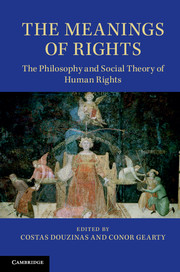Book contents
- Frontmatter
- Contents
- Notes on contributors
- Introduction
- Part I Finding foundations
- Part II Law, rights and revolution
- 5 Philosophy and the right to resistance
- 6 On a radical politics for human rights
- 7 Fanon today
- 8 Race and the value of the human
- Part III Rights, justice, politics
- Part IV Rights and power
- Index
- References
8 - Race and the value of the human
Published online by Cambridge University Press: 05 June 2014
- Frontmatter
- Contents
- Notes on contributors
- Introduction
- Part I Finding foundations
- Part II Law, rights and revolution
- 5 Philosophy and the right to resistance
- 6 On a radical politics for human rights
- 7 Fanon today
- 8 Race and the value of the human
- Part III Rights, justice, politics
- Part IV Rights and power
- Index
- References
Summary
Atheism, being the supersession of God, is the advent of theoretical humanism, and communism, as the supersession of private property, is the vindication of real human life as man’s possession and thus the advent of practical humanism. Atheism is humanism mediated with itself through the supersession of religion, while communism is humanism mediated with itself through the supersession of private property. Only through the supersession of this mediation – which is itself, however, a necessary premise – does positively self-deriving humanism, positive humanism, come into being.
Marx
Fanon’s advocacy of revolutionary change was distinguished by his preparedness to speak in humanity’s name, yet the commitment to a new humanism that runs through his writing has proved to be a tricky subject for contemporary commentators. As a result, his humanism is rarely discussed. However, the claims to novelty and distinctiveness that frame it are ripe for re-assessment today. He makes a series of arguments that move towards what, following the South African psychologist and TRC commissioner, Pumla Gobodo-Madikizela, we can call a “reparative” humanism. This tantalizing prospect can help to clarify a number of problems that characterize the postcolonial world.
The reparation involved in this new humanism is neither straightforwardly financial nor moral. Fanon had an ontological reparation in mind and it was rooted in the specific task of undoing the damage that had resulted from the violent institutionalization of racial orders. Those repairs raised a second important possibility: we may need to begin to become human outside of (as well as in opposition to) racial–corporeal schemas and the epidermalized worlds that they generate.
- Type
- Chapter
- Information
- The Meanings of RightsThe Philosophy and Social Theory of Human Rights, pp. 137 - 158Publisher: Cambridge University PressPrint publication year: 2014



